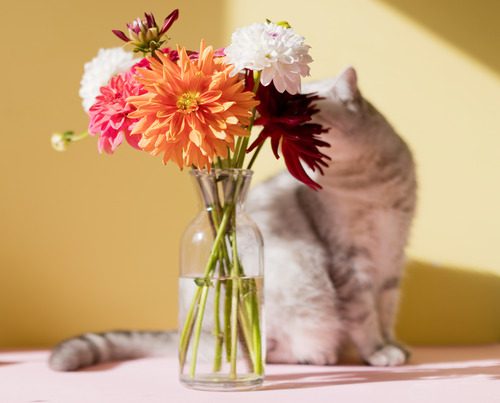Bright, bold, and easy to grow, dahlias are a garden favorite across New England. But if you share your home or yard with a curious cat, it’s worth taking a closer look at what you’re planting. Many pet owners wonder: Are dahlias toxic to cats? Whether you grow them indoors or out, knowing how these flowers can affect feline health is an important step in protecting your pet. This blog explores what makes dahlias potentially dangerous, what symptoms to watch for, and how to respond if your cat comes in contact with one. For personalized guidance or if you have concerns about your cat’s safety, call Millis Animal Hospital at 508-376-5317 or request an appointment online.

What Are Dahlias?
Dahlias are tuberous plants in the Asteraceae family, which also includes daisies, sunflowers, and chrysanthemums. They bloom in a wide range of colors and shapes, making them a staple in many Massachusetts gardens. While humans enjoy their decorative appeal, cats may find them tempting to sniff, paw at, or even nibble. The problem is that not all parts of the plant are safe. Like many ornamental plants, dahlias contain compounds that can cause health issues in pets. Even though these plants aren’t among the most toxic species, contact or ingestion can still lead to unpleasant effects in cats.
Are Dahlias Toxic to Cats?
Yes, dahlias are considered toxic to cats. The American Society for the Prevention of Cruelty to Animals (ASPCA) lists them as causing mild to moderate symptoms if ingested. Both the leaves and petals may contain compounds that irritate a cat’s digestive system or skin. While they are not typically fatal, their impact should not be underestimated.
Cats are naturally curious, and many are drawn to the texture and scent of flowers. Even indoor cats can come into contact with dahlias if they’re part of a bouquet or potted arrangement brought into the home. Knowing the risks associated with dahlia exposure can help you make informed choices about your cat’s environment.
How Do Dahlias Affect Cats?
Exposure to dahlias typically results in mild gastrointestinal or dermatological symptoms. In most cases, the effects show up shortly after a cat interacts with the plant.
Common Symptoms of Exposure
If your cat chews on or rubs against a dahlia, you may notice symptoms such as:
- Drooling or pawing at the mouth
- Vomiting or mild diarrhea
- Decreased appetite
- Lethargy
- Skin irritation or redness, especially around the face or paws
These symptoms often appear within a few hours of contact. If ingestion was significant, your cat may experience more than one of these signs at once. It’s important to pay attention to behavioral changes, even if they seem subtle at first.
Why Symptoms Vary
The severity of a cat’s reaction to dahlias depends on several factors:
- How much plant material was ingested
- Your cat’s size and age
- Existing health conditions
- Sensitivity to plant-based irritants
For some cats, even a small bite could trigger a noticeable reaction. Others may show no symptoms at all. If you suspect your cat may have come into contact with a dahlia, it’s best to consult your veterinarian right away for guidance.
What To Do If Your Cat Is Exposed to Dahlias
Acting promptly is key if your cat has eaten or touched a dahlia. While the toxicity level is considered mild, it’s still important to monitor for symptoms and respond accordingly.
First Steps at Home
If you catch your cat chewing a dahlia, gently remove any plant material from their mouth and paws. You can wipe their fur with a damp cloth to remove any residue, especially if skin irritation is visible. However, avoid giving any home remedies, medications, or attempting to induce vomiting. These actions may cause more harm than good and should only be performed under veterinary supervision.
When to Contact Your Veterinarian
Reach out to your veterinary team if your cat:
- Shows signs of vomiting or diarrhea
- Seems lethargic or disoriented
- Has red or inflamed skin
- Refuses food or water
- Exhibits any change in behavior
At Millis Animal Hospital, our team is here to help if your cat experiences symptoms related to plant exposure. Call 508-376-5317 or schedule a visit online to speak with a member of our medical staff.
How to Prevent Dahlia Exposure at Home
Preventing access to dahlias is the most effective way to protect your cat. This is especially important for cats who like to chew on plants or explore outdoor spaces. Whether you garden in your backyard or keep fresh flowers indoors, consider a few simple precautions.
Garden Safety Tips
If you plant dahlias outside, create barriers that limit your cat’s access to the flower beds. Raised planters, fencing, or supervised outdoor time can help reduce the risk of exposure. It’s also a good idea to keep a list of plants that are toxic to cats and refer to it before adding anything new to your garden. Local nurseries or your veterinarian can provide helpful insight into cat-safe landscaping options.
Indoor Flower Arrangements
Cats often encounter dahlias when they’re part of a floral arrangement. If you receive a bouquet with dahlias, place it in an area your cat can’t reach—ideally a closed-off room or high shelf. To make your home safer, consider switching to non-toxic flowers like orchids, roses, or snapdragons when decorating. While no plant is 100% risk-free, some species are far less likely to cause a reaction.
Cat-Friendly Alternatives to Dahlias
You don’t have to give up flowers entirely to create a safe environment for your cat. Plenty of beautiful blooms can brighten your home or garden without putting your pet at risk. These flowers are generally considered safe for cats:
- Marigolds (Tagetes species)
- Roses (Rosa species)
- Snapdragons
- African violets
- Sunflowers (Helianthus species)
While these are safer alternatives, supervision is still recommended—especially for cats who are persistent plant chewers. Even non-toxic plants can cause minor digestive upset if ingested in large amounts.
Choose Plants That Support a Safe and Happy Home
Creating a pet-friendly environment includes knowing which plants may put your cat at risk. When wondering, are dahlias toxic to cats? the answer is yes—but with awareness and planning, you can prevent accidental exposure. Stick to cat-safe flowers, keep potentially harmful plants out of reach, and contact your veterinarian if you ever have concerns. If you live in the Millis, MA area and have questions about safe plants for your cat—or if you need to book a wellness exam—call Millis Animal Hospital at 508-376-5317 or request an appointment online. Your cat’s safety and comfort are always our priority.
Recent Posts
About Us
Millis Animal Hospital is a privately owned AAHA-accredited, Cat-Friendly Certified practice staffed with Fear Free Certified professionals. We know a thing or two about treating pets and their families the way they deserve, with excellent preventive care and surgical services tailored to your individual needs.
